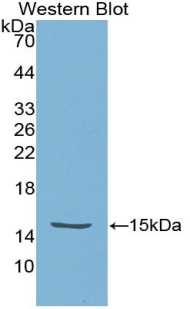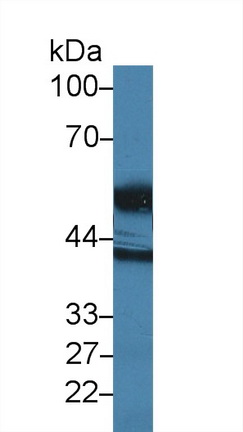Polyclonal Antibody to High Temperature Requirement Factor A1 (HTRA1) 

HtrA; L56; ORF480; PRSS11; HtrA Serine Peptidase 1; Protease,Serine,11; IGFBP5-Protease; High-temperature requirement A serine peptidase 1
- UOM
- FOB US$ 148.00 US$ 346.00 US$ 494.00 US$ 1,235.00 US$ 4,940.00
- Quantity
Overview
Properties
- Product No.PAL604Co02
- Organism SpeciesEscherichia coli Same name, Different species.
- ApplicationsWB
If the antibody is used in flow cytometry, please check FCM antibodies.
Research use only - DownloadInstruction Manual
- CategoryEnzyme & Kinase
- SourcePolyclonal antibody preparation, Host Rabbit
- Ig Type IgG, Potency n/a
- PurificationAntigen-specific affinity chromatography followed by Protein A affinity chromatography
- LabelNone
- Immunogen RPL604Co02-Recombinant High Temperature Requirement Factor A1 (HTRA1)
- Buffer Formulation0.01M PBS, pH7.4, containing 0.05% Proclin-300, 50% glycerol.
- TraitsLiquid, Concentration 0.5mg/ml
Sign into your account
Share a new citation as an author
Upload your experimental result
Review

Contact us
Please fill in the blank.
Specifity
The antibody is a rabbit polyclonal antibody raised against HTRA1. It has been selected for its ability to recognize HTRA1 in immunohistochemical staining and western blotting.
Usage
Western blotting: 0.01-2µg/mL;
Optimal working dilutions must be determined by end user.
Storage
Store at 4°C for frequent use. Stored at -20°C in a manual defrost freezer for two year without detectable loss of activity. Avoid repeated freeze-thaw cycles.
Stability
The thermal stability is described by the loss rate. The loss rate was determined by accelerated thermal degradation test, that is, incubate the protein at 37°C for 48h, and no obvious degradation and precipitation were observed. The loss rate is less than 5% within the expiration date under appropriate storage condition.
Giveaways
Increment services
-
 Antibody Labeling Customized Service
Antibody Labeling Customized Service
-
 Protein A/G Purification Column
Protein A/G Purification Column
-
 Staining Solution for Cells and Tissue
Staining Solution for Cells and Tissue
-
 Positive Control for Antibody
Positive Control for Antibody
-
 Tissue/Sections Customized Service
Tissue/Sections Customized Service
-
 Phosphorylated Antibody Customized Service
Phosphorylated Antibody Customized Service
-
 Western Blot (WB) Experiment Service
Western Blot (WB) Experiment Service
-
 Immunohistochemistry (IHC) Experiment Service
Immunohistochemistry (IHC) Experiment Service
-
 Immunocytochemistry (ICC) Experiment Service
Immunocytochemistry (ICC) Experiment Service
-
 Flow Cytometry (FCM) Experiment Service
Flow Cytometry (FCM) Experiment Service
-
 Immunoprecipitation (IP) Experiment Service
Immunoprecipitation (IP) Experiment Service
-
 Immunofluorescence (IF) Experiment Service
Immunofluorescence (IF) Experiment Service
-
 Buffer
Buffer
-
 DAB Chromogen Kit
DAB Chromogen Kit
-
 SABC Kit
SABC Kit
-
 Long-arm Biotin Labeling Kit
Long-arm Biotin Labeling Kit
-
 Real Time PCR Experimental Service
Real Time PCR Experimental Service
Citations
- Alterations of maternal plasma HTRA1 level in preeclampsia complicated by IUGRPubMed: 23083999
- Upregulation of HtrA4 in the placentas of patients with severe pre-eclampsiaPubMed: 22964307
- Association of frailty with the serine protease HtrA1 in older adultsPubmed:27058767
- HtrA1 up-regulates expression of MMPs via Erk1/2/Rock-dependent pathwaysfiles:ijcep0069706.pdf
- Association between first trimester plasma htra1 level and subsequent preeclampsia: a possible early marker?
- HtrA1 upregulates the expression of ADAMTS-5 in HNPCs via the ERK/NF-κB/JNK signaling pathwayPubmed: 31497227
- First trimester HtrA1 maternal plasma level and spontaneous preterm birthPubmed: 32102578
- Cross-sectional associations among P3NP, HtrA, Hsp70, Apelin and sarcopenia in Taiwanese population33743591







